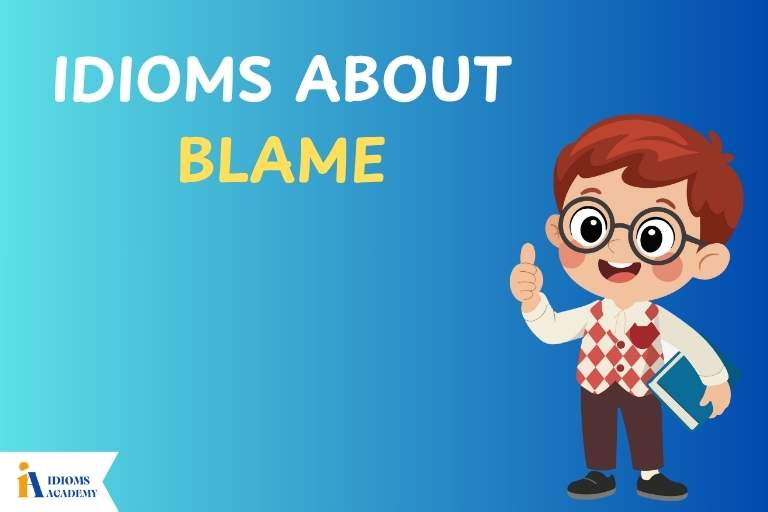It’s easy to get distracted. Sometimes, we daydream in class. Other times, we can’t stop thinking about our favorite video game or a fun weekend plan. When our minds wander like this, it’s hard to focus. To talk about these moments, people often use special phrases called idioms.
Idioms about distraction are fun and help explain how we feel when we can’t pay attention. They use creative language to show how our minds drift or get pulled in different directions. In this article, we will learn some common idioms about distraction. You’ll also see what they mean and how to use them in everyday talk. Let’s get started!
Idioms About Distraction
1. Head in the clouds
Meaning: Not paying attention; daydreaming.
Example Sentence: Emma had her head in the clouds during math class. He didn’t hear me because his head was in the clouds.
Other ways to say: Spacing out, daydreaming
Fun Fact/Origin: This phrase comes from imagining someone so lost in thought that their head is floating up in the clouds.
Usage: Used when someone isn’t focused on what’s happening around them.
2. Lost in thought
Meaning: Deeply thinking about something and not noticing other things.
Example Sentence: She was lost in thought and didn’t hear the bell. He walked past his stop because he was lost in thought.
Other ways to say: Zoned out, distracted
Fun Fact/Origin: People use this when someone is thinking so hard they forget where they are.
Usage: Used when someone is distracted by their own thoughts.
3. Spaced out
Meaning: Not aware of what’s going on; mentally far away.
Example Sentence: I spaced out during the science lesson. He spaced out while doing his homework.
Other ways to say: Zoning out, daydreaming
Fun Fact/Origin: Comes from the idea of someone being far out in space instead of paying attention.
Usage: Used when someone is not mentally present.
4. In la-la land
Meaning: Not connected to reality; dreaming or not focused.
Example Sentence: She was in la-la land during the movie. He didn’t hear the question because he was in la-la land.
Other ways to say: Out of it, not all there
Fun Fact/Origin: “La-la land” is often used to describe a made-up, happy place in the mind.
Usage: Used when someone is not paying attention and seems far away.
5. A wandering mind
Meaning: The mind is jumping from one thought to another.
Example Sentence: My wandering mind kept me from finishing my homework. During class, her mind kept wandering.
Other ways to say: Distracted thoughts, not focused
Fun Fact/Origin: It’s like imagining your thoughts walking away like a traveler.
Usage: Used when someone keeps thinking about many different things instead of focusing.
6. Off in your own world
Meaning: Not aware of others because you are deep in your own thoughts.
Example Sentence: He was off in his own world and didn’t hear us. She was off in her own world, drawing.
Other ways to say: Zoning out, deep in thought
Fun Fact/Origin: It feels like someone has left the room and is living in their own little place.
Usage: Used when someone is so distracted, they don’t notice anything around them.
7. Zoning out
Meaning: Not listening or watching; not aware of what’s happening.
Example Sentence: I zoned out during the history movie. She zoned out while her friend was talking.
Other ways to say: Spacing out, not paying attention
Fun Fact/Origin: Comes from the idea of leaving the present “zone” or moment.
Usage: Used when someone suddenly stops focusing.
8. Off track
Meaning: Not following the plan or topic.
Example Sentence: We got off track during our science talk. His mind went off track while doing his homework.
Other ways to say: Off topic, distracted
Fun Fact/Origin: Comes from trains going off the tracks they’re supposed to follow.
Usage: Used when someone starts thinking or doing something different from the main goal.
9. Eyes glazed over
Meaning: Looking like you’re not paying attention or understanding.
Example Sentence: His eyes glazed over during the long lesson. She looked at the board with her eyes glazed over.
Other ways to say: Blank stare, not paying attention
Fun Fact/Origin: Comes from the way eyes look shiny and still when someone is bored or confused.
Usage: Used to describe someone who is not interested or focused.
10. Can’t keep your mind on one thing
Meaning: Jumping from one thought to another; unfocused.
Example Sentence: I can’t keep my mind on one thing today. She couldn’t keep her mind on her test.
Other ways to say: Can’t focus, distracted easily
Fun Fact/Origin: Describes the brain acting like a butterfly, flying from one flower to the next.
Usage: Used when someone keeps getting distracted.
11. A short attention span
Meaning: Getting bored or distracted very quickly.
Example Sentence: He has a short attention span and can’t sit still. She got tired fast because of her short attention span.
Other ways to say: Can’t focus long, quickly distracted
Fun Fact/Origin: “Span” means a length of time, so a short one means not focusing for long.
Usage: Used when someone can’t stay focused on one thing.
12. Off-topic
Meaning: Talking or thinking about something that isn’t the main subject.
Example Sentence: We were off-topic during our group talk. He kept asking off-topic questions in class.
Other ways to say: Not related, unrelated
Fun Fact/Origin: “Topic” means subject, so being off-topic means moving away from that subject.
Usage: Used when someone starts thinking or talking about something else.
13. Like a squirrel on caffeine
Meaning: Very jumpy and unable to stay still or focus.
Example Sentence: He was like a squirrel on caffeine before the party. She was acting like a squirrel on caffeine during the game.
Other ways to say: Super jumpy, full of energy
Fun Fact/Origin: Squirrels move fast, and adding “caffeine” makes the image even more wild.
Usage: Used when someone is overly excited and distracted.
14. Out to lunch
Meaning: Not paying attention or acting confused.
Example Sentence: I asked him a question, but he was out to lunch. She looked like she was out to lunch during the quiz.
Other ways to say: Spaced out, not with it
Fun Fact/Origin: Doesn’t mean the person is eating—it means their mind isn’t there.
Usage: Used when someone seems mentally far away.
15. In one ear and out the other
Meaning: Someone hears something but forgets or ignores it right away.
Example Sentence: Mom’s advice went in one ear and out the other. The teacher’s warning went in one ear and out the other.
Other ways to say: Didn’t stick, ignored
Fun Fact/Origin: Imagine words going through a tunnel—one ear to the other—with no stop.
Usage: Used when someone doesn’t remember or follow what was said.
16. Not all there
Meaning: Seeming confused or not paying full attention.
Example Sentence: He seemed not all there during class. She was not all there when we talked.
Other ways to say: Not focused, a bit off
Fun Fact/Origin: Suggests the person isn’t mentally present, like part of them is missing.
Usage: Used when someone acts spaced out or distracted.
17. Like herding cats
Meaning: Trying to control people or things that keep wandering.
Example Sentence: Getting the class to sit still was like herding cats. Keeping the kids quiet was like herding cats.
Other ways to say: Hard to control, scattered
Fun Fact/Origin: Cats don’t like to stay in one place, so they’re hard to gather.
Usage: Used when trying to manage a group that won’t stay focused.
18. Butterflies in your stomach
Meaning: Feeling nervous or jumpy inside.
Example Sentence: He had butterflies in his stomach before the speech. She got butterflies in her stomach on stage.
Other ways to say: Nervous, jumpy
Fun Fact/Origin: This comes from the fluttery feeling we get in our bellies when worried.
Usage: Used when nerves make it hard to focus.
19. Drifting off
Meaning: Slowly falling asleep or losing focus.
Example Sentence: He started drifting off during the movie. I drifted off in class because I was tired.
Other ways to say: Falling asleep, zoning out
Fun Fact/Origin: Comes from the idea of something slowly floating away.
Usage: Used when someone slowly stops paying attention.
20. Mind like a sieve
Meaning: Forgetting things easily.
Example Sentence: I have a mind like a sieve—I forgot my homework again. She has a mind like a sieve when it comes to names.
Other ways to say: Forgetful, doesn’t stick
Fun Fact/Origin: A sieve has holes, so things fall through—like memories in a forgetful mind.
Usage: Used when someone can’t remember things.
21. Off the wall
Meaning: Strange or silly ideas that don’t make sense.
Example Sentence: His off-the-wall ideas made us laugh. That question was really off the wall.
Other ways to say: Weird, random
Fun Fact/Origin: Suggests something bouncing wildly, like thoughts hitting a wall.
Usage: Used when someone says or thinks something unusual or silly.
22. Lights are on, but nobody’s home
Meaning: A person seems awake but isn’t really paying attention.
Example Sentence: He looked awake, but it was like the lights were on and nobody’s home. She smiled, but the lights were on and nobody’s home.
Other ways to say: Out of it, not really here
Fun Fact/Origin: It means someone’s body is present, but their mind isn’t.
Usage: Used when someone looks alert but is totally distracted.
23. Can’t sit still
Meaning: Always moving around and not able to stay in one place.
Example Sentence: He can’t sit still during class. She couldn’t sit still through the whole movie.
Other ways to say: Fidgety, jumpy
Fun Fact/Origin: Describes people who are too full of energy or excitement.
Usage: Used when someone is too active to focus.
24. Mind wandered
Meaning: Stopped thinking about what you were doing.
Example Sentence: My mind wandered during the test. Her mind wandered while reading.
Other ways to say: Got distracted, not focused
Fun Fact/Origin: Like your thoughts went off on a little trip.
Usage: Used when someone suddenly starts thinking about something else.
25. Can’t concentrate to save your life
Meaning: Not able to focus at all.
Example Sentence: I couldn’t concentrate to save my life today. He couldn’t concentrate on saving his life during the quiz.
Other ways to say: Totally distracted, can’t focus
Fun Fact/Origin: It’s a silly way of saying focusing is really hard right now.
Usage: Used when someone completely fails to focus, no matter what.
Quiz: Idioms About Distraction
Instructions: Read each question and the answer choices carefully. Pick the letter that best matches the meaning of the phrase or expression.
Question Key
1. What does “head in the clouds” mean?
A) Thinking about clouds
B) Daydreaming and not paying attention
C) Playing outside
2. If someone is “lost in thought,” what are they doing?
A) Sleeping
B) Watching TV
C) Thinking deeply and not noticing things
3. What does “zoning out” describe?
A) Staying focused
B) Not paying attention
C) Reading carefully
4. If your “mind wandered,” what happened?
A) You stayed on task
B) You left the room
C) You started thinking about other things
5. What does “in one ear and out the other” mean?
A) You listened carefully
B) You forgot what was said quickly
C) You asked more questions
6. What does “lights are on, but nobody’s home” mean?
A) The person is sleeping
B) The person is alert and focused
C) The person looks awake but isn’t paying attention
7. If someone has “a short attention span,” what do they do?
A) Focus for a long time
B) Get distracted quickly
C) Ignore fun things
8. What does “like a squirrel on caffeine” mean?
A) Calm and relaxed
B) Tired and sleepy
C) Very jumpy and unfocused
9. What does “can’t sit still” mean?
A) Focused and calm
B) Always moving around
C) Sleeping quietly
10. What does “out to lunch” mean?
A) Someone is eating lunch
B) Someone is not paying attention
C) Someone is making lunch plans
Answer Key
- B) Daydreaming and not paying attention
- C) Thinking deeply and not noticing things
- B) Not paying attention
- C) You started thinking about other things
- B) You forgot what was said quickly
- C) The person looks awake but isn’t paying attention
- B) Get distracted quickly
- C) Very jumpy and unfocused
- B) Always moving around
- B) Someone is not paying attention
Wrapping Up
Idioms about distraction help us describe how our minds can drift away from what we are doing. These phrases use fun and clear language to explain different ways we lose focus. By learning these idioms, you can better talk about moments when you’re not paying attention. Now you know 25 ways to say someone is distracted. Try using them when you notice your own mind wandering—or when someone else isn’t quite focused!




